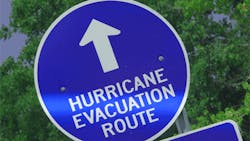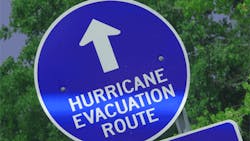Mandatory Evacuations: A Right of Refusal or a Citable Offense?
Imagine a major storm is approaching, and it has your house in its cross hairs. You call a family meeting to decide the best way to prepare for this storm.
Should we round up emergency supplies? Yes! Should we board up the house and fill the cars with gas? Yes! What about food, batteries, flashlights, water, clothing, valuables, pets? Yes, yes, of course!
As you make these decisions, a determined knock on the door startles you. It’s the local authorities advising you and your family that mandatory evacuation orders are in effect for your neighborhood. “Everyone must evacuate,” says the hurried and worried emergency service worker – after all, her own family is waiting for her at home to finalize their own preparations.
After a moment of shock, you explain you intend to hunker down in your home. “We have lived here for decades and nothing has ever happened,” you rationalize. “We will not leave our home behind.”
But the emergency services worker is not swayed: “The governor has declared a state of emergency, and this neighborhood is declared as an area of mandatory evacuation,” she continues. “Your lives and those of our rescuers are placed in harm’s way if you choose to stay.”
“Thank you for letting us know,” you politely respond, “but we are not leaving. This is our house! All we have is right here. We have an emergency power generator, food, water and everything we need to hunker down. We’ll be fine.”
Holding Your Ground
After a few more attempts to urge your family to safely evacuate, the emergency professional gives you one last worried glance and disappears into the darkness.
As the night stretches on, the electrical power grid goes out. Your emergency power generator comes to the rescue. All is good, you rationalize.
Soon, swirling wind gusts whistle warnings of danger. The skies are opened by the lightning and dropped by the thunder. The waters rise an inch, then two, then six, then 10. Debris floats by outside. The wolf blows upon your door just like it did in a childhood story. It huffs, and it puffs, and it starts to blow your house down.
This is a real emergency, you realize. Maybe it's time to grab whatever you can and evacuate.
There is one small problem, however. Now you have to wade through several feet of frigid, fast-flowing, debris-infused and contaminated water while 75-mile-an-hour winds rage outside. You notice that the concerned emergency response professional is not at your doorstep extending a helping hand. Your life and that of your beloved family is in serious peril.
“How can this be happening to us?” you wonder. “Somebody help! HELP! HELP!” Shock and awe, fear and desperation overcome you.
Then, right before your eyes, one of you family members is swept away by the floodwaters while you remain helpless. You can only watch it happen.
Waiting for Rescue
At last, you detect the sound of a rescue boat in the distance, followed by the woof, woof, woof of a helicopter. A valiant hero drops from the heavens, suspended from the helicopter by a rope. She and the black bird are swinging at the mercy of the wind.
Just as her saving hand reaches yours, she is hit by a powerful crosswind and is swept away. The only silhouette now in the sky is that of swirling clouds jousting for position and bearing down upon your family, your home and your neighborhood, as predicted days before.
Out of nowhere, another hero appears, this time on a boat. You and your remaining family members are pulled aboard by his strong hands and taken to safety.
Behind you, somewhere in the floodwaters and the storm, remain your lost family member and that emergency responder who tried so valiantly to save you – all because you refused orders to evacuate.
Freedom or Accountability?
So here’s the question: Should the citizens of our great nation have the right to place themselves and others in situations that are highly likely to cause serious harm or death, or should they be held accountable for the consequences of their choices?
Let's explore a sample of existing safety laws that take away a citizen’s freedom to act if those acts could endanger themselves or others:
Traffic Laws
- You may not choose to run a stop sign or red light.
- You may not choose to exceed posted speed limits.
- You may not choose to park in no-parking zones.
- You may not choose to ignore a school bus picking up children.
- You may not choose to forgo the use of turn signals when turning.
- You may not choose to make a U-turn where prohibited.
- You may not choose to drink and drive.
- You may not drive your vehicle in ways that endangers yourself and others.
Criminal and Civil Laws
- You may not choose to strike another person.
- You may not choose to threaten another person.
- You may not choose to keep another person against his or her will.
- You may not choose to take another person’s life.
- You may not unilaterally choose to willfully place another person in harm’s way.
- You may not choose to stay in your vehicle when asked to step out of said vehicle by a law enforcement officer.
- You may not choose to engage in illegal activities in or from your home.
We can, with a high level of certainty, predict storms and their intended paths and anticipate their devastating effects. Given this fact, should the affected populace be permitted to choose their course of action by not evacuating when asked, or be held accountable for the consequences of their actions?
Should there be significant penalties if others are required to risk their lives simply because the citizen ignored the word “mandatory” in the term “mandatory evacuation?”
Should choosing not to evacuate be a right of refusal or a citable offense as it is with other laws put in place to protect against similar and predictable outcomes?
Is it a right to purposefully tempt fate at the potential expense of life during a state of emergency, or should it be a crime to do so?
Hmmm.
About the Author
J. A. Rodriguez
J.A. Rodriguez Jr., CSP
J.A. Rodriguez Jr., CSP, ASP, is a Director on the Strategic Advisement Team at the Board of Certified Safety Professionals and the CEO of Make My Day Strategies LLC. He has led record-breaking and award-winning EHS teams while supporting $7B annually in business across 100+ countries. Rodriguez was honored to be selected by EHS Today as one of "The 50 People Who Most Influenced EHS in 2012-2013" and "2014 - 2015.” He also is an empowering and international keynote speaker, entrepreneur, a patented inventor, an engineer, a certified safety professional, author of the book "Not Intuitively Obvious – Transition to the Professional Work Environment" and co-editor of the American Society of Safety Engineers’ book “Consultants Business Development Guide.” Dare to think differently.

